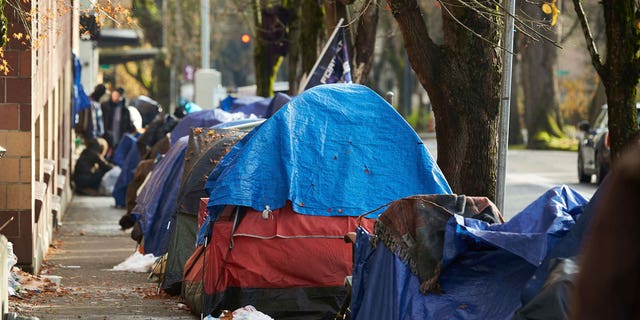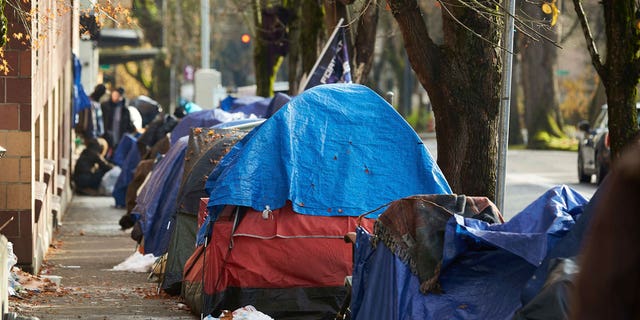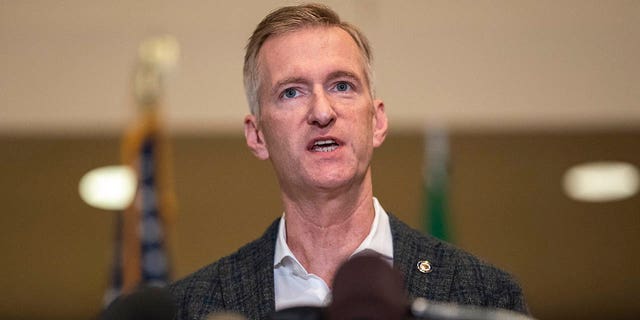
Nearly three years after the start of the coronavirus pandemic, the city of Portland, Oregon continues to have one of the nation’s most visible homeless problems as thousands of tents and tarps remain set up across the city in unsanctioned encampments. But now a lawsuit filed on behalf of Portland residents with disabilities has uncovered the source of perhaps the vast majority of those tents—taxpayers.
John DiLorenzo, who represents the plaintiffs in an Americans with Disabilities Act lawsuit against Portland, said, “The taxpayers are paying the county to put tents in place, which the city is in turn charging the taxpayers to sweep up.”
“It’s sort of like trying to walk up the down escalator,” he added.
During the discovery phase of the lawsuit, DiLorenzo says he learned Multnomah County’s Joint Office of Homeless Services (JOHS) paid $2 million for 22,000 new tents and 70,000 tarps. It was also revealed that JOHS had virtually no accounting for who eventually received the tents or where they were set up.
IDAHO GOVERNOR WINS LAWSUIT AGAINST ILLEGAL ENCAMPMENT OUTSIDE CAPITOL: ‘WE ARE NOT PORTLAND’

Tents line the sidewalk on SW Clay St in Portland, Ore., on Dec. 9, 2020. City council members in Portland, Oregon, voted on a resolution that would ban homeless street camping. (AP Photo/Craig Mitchelldyer, File)
“You provide them (homeless individuals) 22,000 tents and tarps over a couple years, we believe the likelihood is quite high that most of those tents and tarps are what ended up on the sidewalks, streets and in the parks,” DiLorenzo said.
The lawsuit seeks to require the City of Portland to remove all the encampments that currently block public sidewalks and parks. It claims Portland is in violation of the Americans with Disabilities Act by allowing tents and tarps to impede those people using wheelchairs, walkers or canes to get around.
Denis Theriault is the spokesperson for JOHS. In a statement he tells Fox News, “Outreach workers generally tell people to sleep where it’s legal and safe to do so, to avoid being swept. And they offer information…on where folks aren’t allowed to be. But they can’t ultimately control where folks set up.”

Portland Mayor Ted Wheeler spoke at City Hall in Portland, Oregon on August 30, 2020. A man had been shot and killed Saturday night as a Pro-Trump rally clashed with Black Lives Matter protesters in downtown Portland. (Photo by Nathan Howard/Getty Images)
Taxpayers are getting hit on both ends of the tent crisis. They paid for the cost of purchasing the tents and tarps and now they are paying for the cost of removing them. And the price of cleaning an unsanctioned camp is steep as used needles and biohazards are usually left behind. Portland recently increased its contract with Rapid Response Bio Cleaning to $26.6 million over four years.
CLICK HERE TO GET THE FOX NEWS APP

Homeless encampments near downtown Portland. Homelessness is among the many issues affecting the city that voters bore in mind when opting to restructure its council. (AP Photo/Craig Mitchelldyer, File)
Mayor Ted Wheeler’s spokesman, Cody Bowman said the cost is justified. “We have 800 self-sited unsanctioned campsites across 146 miles of Portland,” Bowman says, “This is a public health emergency.”






